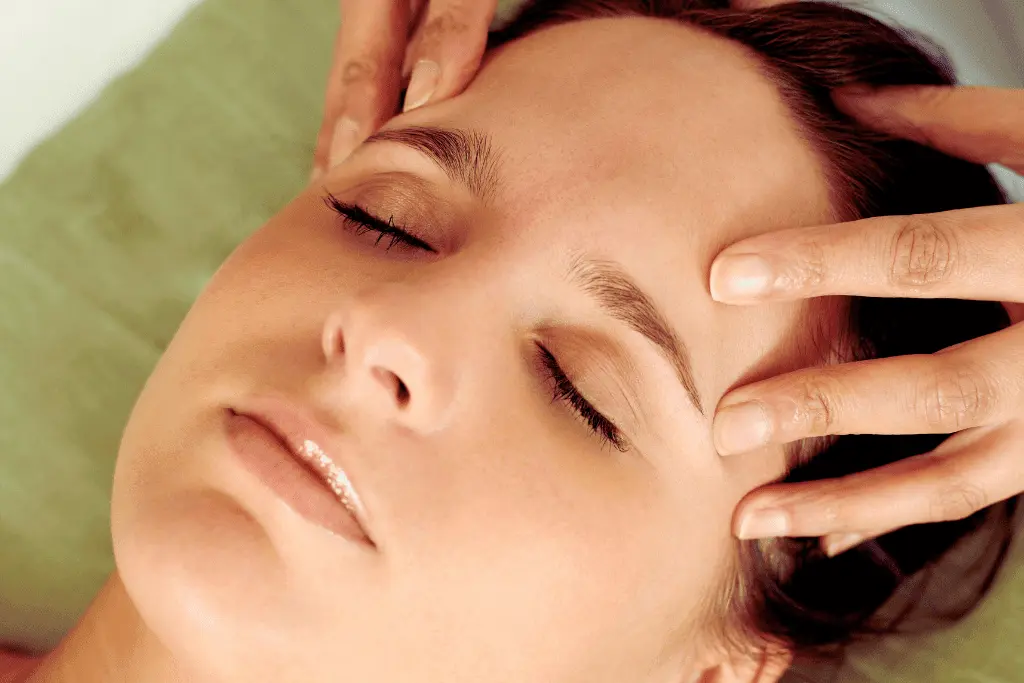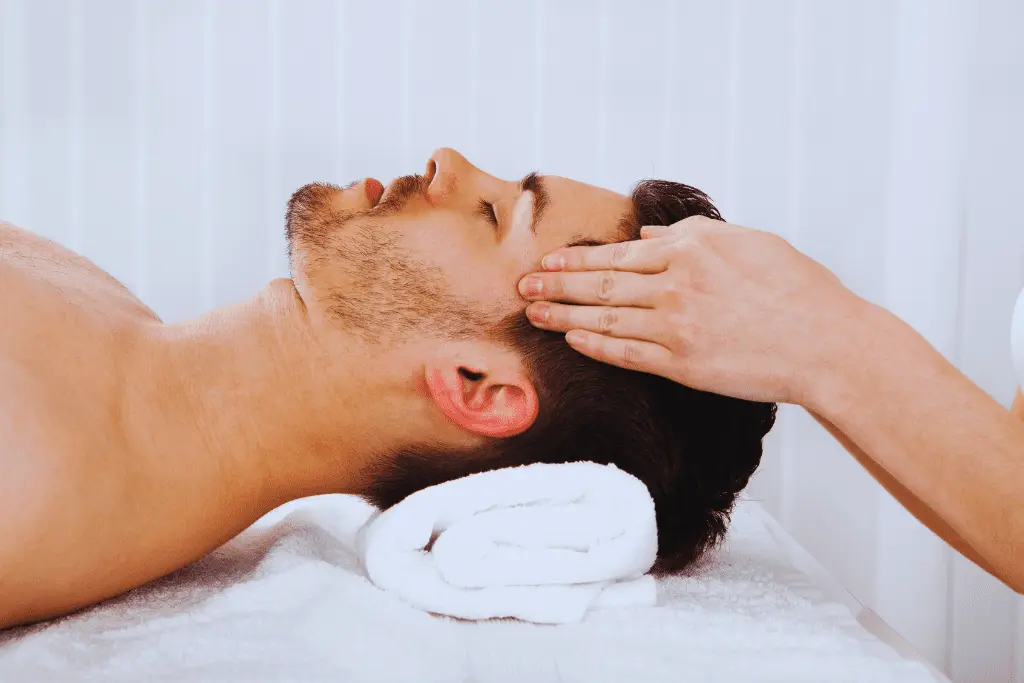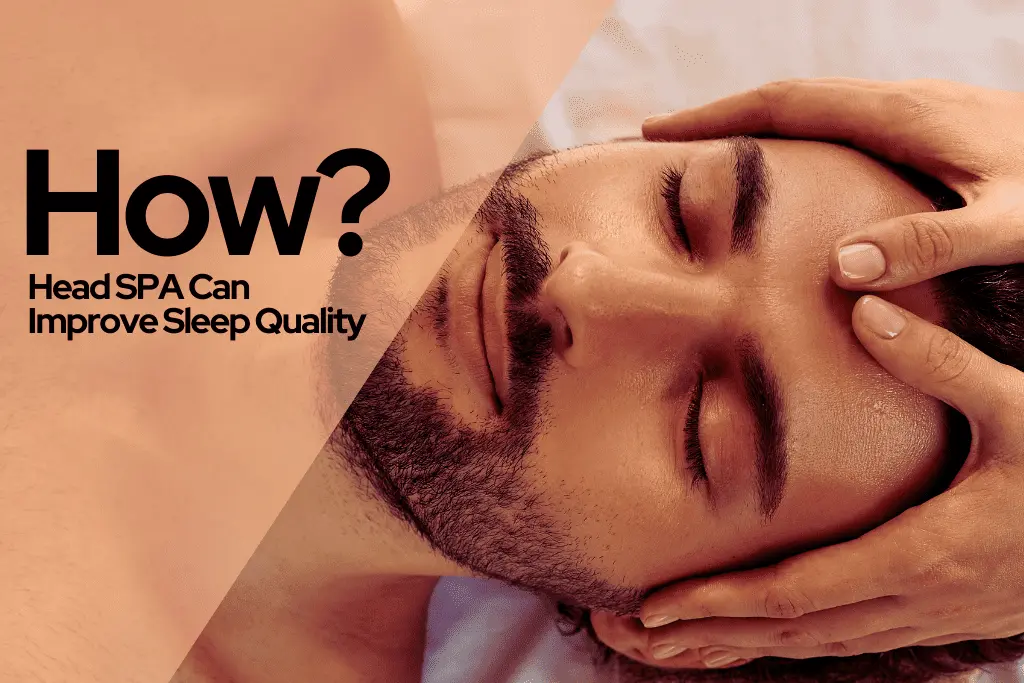Having trouble sleeping throughout the night? Discovering the secret to a restful night’s sleep may come as a pleasant surprise. It might be directly above you. In addition to the soothing massages and aromatic treatments they provide, head spas are gaining popularity due to their ability to improve sleep quality.
However, the question arises that how does prioritizing the well-being of your head contribute to achieving a more restful sleep?”
This article provides a comprehensive exploration of the fascinating connection between maintaining a healthy scalp and experiencing restful sleep. Besides, it discusses the impact of scalp massages on the nervous system and their ability to induce relaxation.
Explore the distinctions between head spas and other sleep aids, delve into the mental advantages that promote better sleep, and address any inquiries you may have prior to your initial appointment.
We will discuss the significance of aromatherapy in head spas and its potential to enhance your quality of sleep. Prepare yourself for an enlightening exploration into the potential benefits of a luxurious scalp treatment for improving your quality of sleep.
Understanding The Connection Between Scalp Health And Sleep
There are many parts to our health that all work together, and the health of your head has an interesting effect on how well you sleep. This interesting link can be broken down in the following ways:
Fix And Restoration Of The Body
Our bodies fix and restore themselves faster while we sleep deeply. This means that there is more blood flow to the head, which feeds and oxygenates the hair cells. Once you don’t get enough sleep for a long time, this flow can stop. This can weaken hair and change how it grows.
Stress Hormones And Inflammation
When it comes to stress chemicals and inflammation, getting enough good sleep is important. When you don’t get enough sleep, your cortisol levels can go up. This can make your body and hair swell up.
The Hair Growth Cycle
To keep your hair growth cycle healthy, you need to get enough sleep. This cycle can get thrown off if you have trouble sleeping, which could make you lose more hair and thin it out.
How Scalp Massages Affect The Nervous System
Scalp rubs work the muscles of the head and neck by gently pressing on them and moving them in circles. Several things can happen to the nerve system because of this stimulation:
- Relaxation Response: A massage on the scalp turns on the parasympathetic nerve system, which manages digestion and rest. Blood pressure, heart rate, and stress chemicals like cortisol can go down.
- Pain Relief: The motion of massaging activates pressure receptors under the skin, which send messages to the brain about how painful something is. This can stop pain messages from getting to the brain, which can help with muscle tension, headaches, and migraines.
- Better Blood Flow: The pressure and motions of massaging help get more blood to the brain and head. More oxygen and nutrients can reach these areas when circulation is better, which can improve brain function and make you feel less tired.
- Nerve Stimulation: Gentle pulling and stimulation of the nerves in the head can wake up cranial nerves that are linked to the brain stem. This can help you rest, ease muscle tension, and even make your hair grow faster.
- Endorphin Release: Like other types of massage, scalp massage may cause endorphins to be released. Endorphins are the body’s natural painkillers that make you feel good.

Comparing Head Spas With Other Sleep Aids
When it comes to enhancing sleep quality, there are several options available, including head spas and various other sleep aids. Each method offers unique benefits and may cater to different preferences or needs. Here’s a comparison to help understand how head spas stack up against other common sleep aids:
Head Spas
Benefits:
- Relaxation and Stress Reduction: Head spas often involve scalp massages that can help reduce stress and induce relaxation.
- Improved Circulation: The massage techniques used in head spas can improve blood flow to the scalp and brain, potentially enhancing sleep quality.
- Sensory Experience: The tactile sensation combined with a calming environment and aromatherapy can deeply relax the mind and body.
Limitations:
- Accessibility: Regular visits to a head spa can be costly and may require scheduling in advance.
- Individual Sensitivity: Some people might find the scalp massages too intense or uncomfortable.
Medication
Benefits:
- Effectiveness: Prescription and over-the-counter sleeping pills can be highly effective for short-term relief of sleep issues.
- Quick Action: Medications typically act fast, helping people fall asleep quicker than non-pharmaceutical methods.
Limitations:
- Dependency and Side Effects: There’s a risk of dependency and other side effects such as grogginess and long-term health effects.
- Not a Long-Term Solution: They are usually recommended for short-term use and do not address the underlying causes of insomnia.
Natural Supplements
Benefits:
- Natural Ingredients: These supplements use natural compounds that can aid sleep without the harsh effects of synthetic drugs.
- Gentle on the Body: They tend to have fewer side effects compared to prescription sleep aids.
Limitations:
- Variable Efficacy: The effectiveness can vary widely among individuals.
- Regulation: Dietary supplements are less regulated than prescription medications, which can lead to consistency and purity concerns.
Lifestyle Adjustments
Benefits:
- Long-Term Benefits: Improving sleep hygiene or practicing meditation can offer long-lasting improvements in sleep quality.
- No Physical Side Effects: These methods do not involve ingesting substances, thus avoiding physical side effects.
Limitations:
- Requires Consistency and Effort: Changes in lifestyle or habits often require sustained effort and may take time to show results.
- Self-Discipline: These methods depend heavily on the individual’s willingness and ability to adhere to a consistent routine.
Technology-Based Aids
Benefits:
- Customization: Many tech-based aids offer customization options to suit individual preferences, like different soundscapes.
- Convenience: Easy to use and can be integrated into a nightly routine without much effort.
Limitations:
- Dependence on Technology: Continuous use might make sleep contingent on technology, which can be problematic during travel or power outages.
- Variability in Effectiveness: Not everyone may find technological solutions effective, depending on personal sensitivities and preferences.

Mental Benefits Of Head Spas
Head spas aren’t just about pampering your scalp; they offer a surprising range of mental benefits that can significantly improve your sleep quality. Here’s how:
Stress Reduction: The gentle massage techniques used in head spas work wonders in melting away tension. Head spas work by stimulating pressure points and boosting blood flow, which can greatly lower stress hormones like cortisol, making you feel more relaxed and ready for sleep.
Improved Mood: The release of endorphins during a head spa massage has a mood-boosting effect. These “feel-good” chemicals can combat anxiety and leave you feeling relaxed and optimistic, promoting a more positive state of mind for sleep.
Mindfulness and Focus: The spa environment itself, often featuring calming music and aromatherapy, encourages a sense of mindfulness. Focusing on the soothing sensations during the head spa helps you quiet your mind and clear your thoughts, making it easier to fall asleep.
Reduced Headaches and Tension: Chronic headaches and muscle tension in the neck and scalp can significantly disrupt sleep. Head spas can address these issues by promoting relaxation in those areas, leading to pain relief and a more comfortable sleep experience.
Things To Know Before Your Head Spa Appointment
A head spa appointment can be a wonderfully relaxing and rejuvenating experience, ideal for those looking to relieve stress and improve scalp health. To make the most of your visit, here are some key things to consider before you head to your appointment:
- Know the Treatments: Learn what treatments they offer and how long they last.
- Prepare Your Hair: Wash your hair and avoid using styling products like hairspray or gel.
- Mention Scalp Conditions: Tell your therapist about any scalp issues or allergies to ensure safe and suitable treatment.
- Wear Comfortable Clothes: Choose outfits that are easy to relax in.
- Don’t Rush Afterward: Keep your schedule clear after the spa to keep relaxing.
- Cancellation Policy: Check the spa’s policy on cancellations to avoid any fees.
- Talk to Your Therapist: Discuss what you want from the treatment to make sure it meets your needs.
- Cost and Tipping: Understand the cost and whether you should tip.
- Follow Aftercare Advice: Ask about any care tips or products to use after your session.
- Visit Regularly If Needed: Ask how often you should come back to maintain good scalp health.
Ideal Times For A Head Spa For Better Sleep
To maximize the soothing benefits and improve your sleep quality, consider scheduling your head spa services for the late afternoon or early evening, specifically between 4 and 6 PM. Rest assured that this time slot will not disrupt your usual sleep schedule, allowing you to relax and recharge before going to bed.
To optimize your relaxation session and avoid the hassle of waking up early the following day, consider scheduling it on the evening prior to a day off. Adding regular visits to your sleep routine can offer consistent advantages. To ensure a peaceful night’s rest, it’s best to avoid scheduling appointments too late in the evening.
Effects Of Aromatherapy During Head Spas On Sleep
Aromatherapy, when combined with head spas, can significantly enhance the relaxation experience and potentially improve sleep quality. Using essential oils that are known for their calming effects, aromatherapy adds a soothing touch to the relaxation process, helping you wind down effectively before sleep.
Effects
- Stress Reduction: Essential oils like lavender and chamomile are renowned for their ability to reduce stress and anxiety, creating a conducive environment for rest.
- Improved Sleep Quality: Aromas such as ylang-ylang and sandalwood can increase the quality of sleep by extending the duration of the deep sleep phase.
- Relaxation of Mind and Body: Scents like bergamot and jasmine not only soothe the mind but also relax the muscles, making it easier to fall asleep and stay asleep.
- Regulation of Sleep Patterns: Regular use of calming scents can help regulate sleep patterns, making it easier to establish a healthy sleep routine.
- Enhanced Mood: Aromatherapy uplifts spirits and can positively affect overall mood, which is beneficial for a good night’s sleep.
Conclusion
Head spas present a distinctive and all-encompassing method to boost sleep quality. They tackle both the physical and mental facets of relaxation, including scalp wellness, stress alleviation, and mood improvement, offering a comprehensive answer for those grappling with sleep issues.
Integrating aromatherapy into these sessions magnifies the advantages further, helping to soothe the mind and body while regulating sleep patterns. Whether through routine appointments or as a timely remedy after taxing events, head spas represent a beneficial investment in your overall well-being and the health of your sleep.

